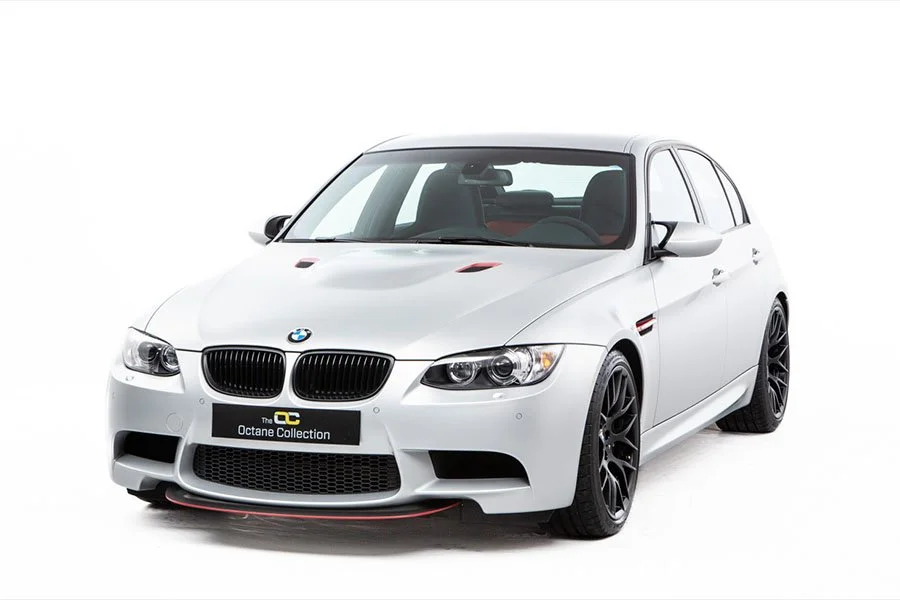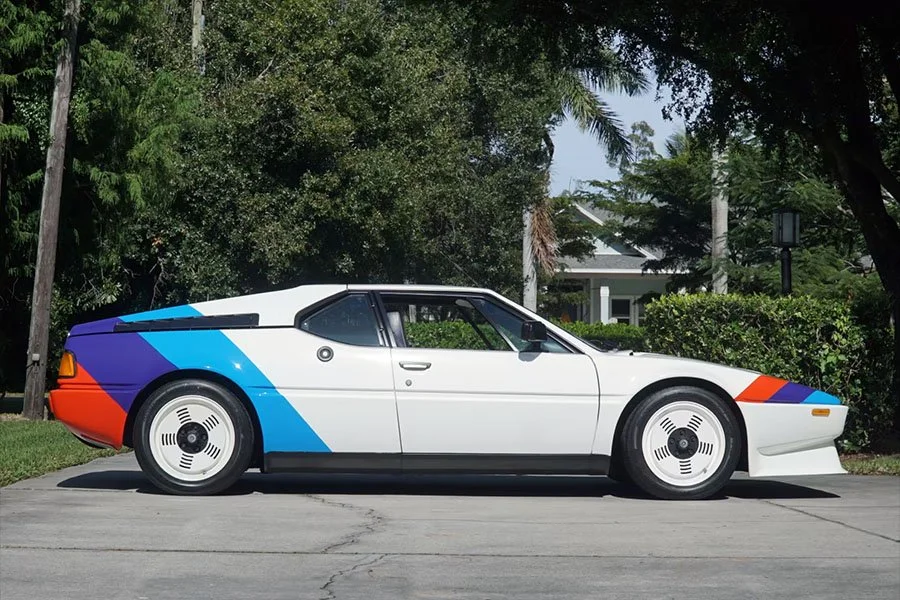Guide: BMW Nazca C2 Ital Design - a Historical & Technical Appraisal
/BACKGROUND
Although the E26 M1 ultimately received critical acclaim on account of its styling, build quality, driving dynamics and overall performance, BMW’s first attempt at creating a mid-engined two-seat supercar had proven something of a nightmare.
With much of the M1’s design and development work outsourced to Lamborghini which it later became apparent was teetering on the edge of bankruptcy, the E26 arrived much later than anticipated so BMW could not homologate the car for competition use within the timeframe originally envisaged.
In light of this debacle, any plans for an immediate successor were quickly thrown out and BMW re-focused on building the kind of Saloons, Coupes and Convertibles for which it had become renowned.
The Munich firm next deviated from its usual fare with the avant-garde Z1, a two-seat Roadster based on contemporary 3-series underpinnings that sold extremely well following its launch at the Frankfurt Motor Show in September 1987.
An undeniable factor in the Z1’s strong sales performance was a booming environment for high end collectable and exotic cars as investors piled into the market looking for alternative high yielding asset classes after the October 1987 stock market crash. By the spring of 1990, things were red hot with some cars selling at multiples of their list price at which point BMW sanctioned Ital Design to create a potential M1 successor.
The resultant Nazca M12 made its debut at the Geneva Motor Show in March 1991, however, BMW were not sufficiently convinced by certain aspects of the car so Ital Design was commissioned to create a revamped version for completion later that year. For this second iteration of the Nazca theme, the opportunity was also taken to enhance the original Nazca’s V12 power unit which had been imported straight from the E31 850i.
Seven months later, the wraps came off arguably the most impressive BMW design concept yet seen when the Nazca C2 broke cover at the Tokyo Motor Show in October 1991.
CHASSIS
Like the Nazca M12, the C2 version was based around a state-of-art carbon composite monocoque with tubular subframes at either end to support the suspension, engine, gearbox and other ancillary equipment. A 2600mm wheelbase was retained.
Double wishbones were used at either end with single spring / damper units at the front and two per side at the back. Body control was enhanced thanks to an anti-roll bar for both axles.
The brake system employed Bosch ABS with 355mm ventilated discs all round.
For the C2, handsome new five spoke alloy wheels were fitted. They now had a 17-inch instead of 18-inch diameter but were considerably wider than before: 9.5-inches on 235/45 ZR17 tyres at the front (up from 8-inches wide) and 13-inches on 335/35 ZR17 tyres at the rear (up from 10-inches wide). Track dimensions expanded accordingly.
ENGINE / TRANSMISSION
In the engine bay was another iteration of BMW’s renowned Type M70 60° V12 that featured an aluminium alloy block and heads with single overhead camshafts per bank, two valves per cylinder and wet-sump lubrication.
Whereas the Nazca M12 came equipped with a standard 295bhp Type M70 B50 five-litre V12 lifted straight from the 850i, the C2 received an Alpina-tuned version as developed for the B12 5.0.
Alpina offered two versions of the B12 5.0: one based on the E32 7-series Saloon and the other based on the E31 8-series Coupe.
Although displacement was an unchanged 4988cc (thanks to a bore and stroke of 84mm and 75mm respectively), these tweaked Alpina motors were significantly modified to include bigger valves, high-lift camshafts, special pistons, a compression ratio hiked from 8.8:1 to 9.5:1 and re-mapped Bosch M1.7 Motronic engine management.
As a result of this enhanced specification, the power output went from 295bhp at 5200rpm to 350bhp at 5300rpm.
There was also a useful torque gain with 347lb-ft now on tap at 4000rpm compared to 332lb-ft at 4100rpm for the off-the-shelf motor.
Transmission was through a five-speed manual Getrag 560G gearbox and single-plate clutch.
BODYWORK
Although the M12 and C2 shared many external design characteristics, everything bar the domed cockpit was revised for this latest iteration of the Nazca theme.
Perhaps most noticeably, the subtly re-profiled single-piece front bodywork featured light clusters mounted in cutaways adjacent to the trademark BMW kidney grilles whereas the M12 had used covered Z1 units mounted atop the front fenders. There was also a neater, more aggressive chin spoiler that housed a trio of slim intakes and added 63mm to the car’s length. Further up, a large cooling vent was carved out from between a pair of arrow-like ribs that swept from the nose all the way back to the tail.
In order to accommodate the C2’s broader track, its fender treatment became more bulbous; in total 95mm was added to the car’s width which meant the intakes ahead of each rear wheel were able to become more smoothly integrated.
New handles were moved from the tops of the doors to the sides. Like the M12, cockpit access required the doors be opened conventionally and the windows raised separately in Gullwing fashion.
Ital Design left the M12’s handsome back end largely intact, however, the previously enclosed upper section of the tail fascia between the lights was opened up to improve airflow and a bridge spoiler was added above. A neater rear apron was also fitted to match the revised chin spoiler up front.
As before, body panels were manufactured exclusively from carbonfibre. The single-piece front clam shell was fixed in position while the rear section was hinged at its trailing edge to enable access into the engine bay and luggage box.
INTERIOR
Inside, Ital Design added a pair of new leather-trimmed carbonfibre bucket seats with body coloured backs but little else was changed in the transition to C2 trim as the M12 cockpit had been extremely well executed and largely appeared production-ready.
Located directly behind the three-spoke steering wheel was a primary binnacle with large analogue read outs for road and engine speed and smaller dials for water temperature and fuel. Fully integrated with the main binnacle was a central control panel heavily angled towards the driver that housed the onboard computer, audio system and ventilation controls.
The switchgear and instrumentation was sourced from BMW.
The seats were trimmed in leather to match the dash, transmission tunnel, door panels and sills.
WEIGHT / PERFORMANCE
Thanks to greater use of lightweight materials, the C2 tipped the scales 98kg less than the M12 version (1000kg as opposed to 1098kg).
Top speed was once again quoted as 180mph, but with an extra 55bhp and nearly 100kg less to lug around, the 0-62mph time dropped from 4.5 to 4.1 seconds.
RECEPTION / PRODUCTION
Unfortunately, by the time the Nazca C2 broke cover at the Tokyo Motor Show in October 1991, the recessionary mood that blighted the original M12’s reception had worsened. Buyers had deserted the high end car market and, with no short-term improvement on the horizon, BMW canned any prospect of putting the C2 into production.
Accordingly, the C2 Nazca remained a tantalising one-off glimpse into how an early 1990s BMW supercar may have looked.
No further copies of the C2 Coupe were built although Ital Design did subsequently create a modified Spider version with a larger 5.6-litre engine and six-speed gearbox from the 850 CSi which made its debut at the Monaco Grand Prix in May 1993.
Text copyright: Supercar Nostalgia
Photo copyright: Ital Design - http://www.italdesign.it


































